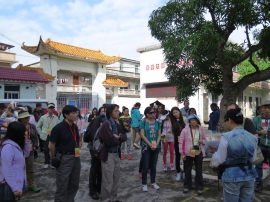Two Teachers of our School Taking Part in the Tung Wah China Trip Learning History of Tung Wah
本校兩位老師參與東華三院國內考察團,了解東華三院歷史
 Two teachers from our school, namely Ms. Lee Chi Fan and Mr. Ng Lik Hang, have been taking part in a two-day delegation on a study tour on 13th to 14th of November. The trip was organised by the Tung Wah Group of Hospital, and was a fruitful trip that the teachers learned a lot about the emigration of Chinese in modern times, and the indispensable role of Tung Wah Hospital in the process of homecoming of the bones of those compatriots. During the trip, Mr. Tim Ko, a researcher on local history, delivered lectures about the Hong Kong history.
Two teachers from our school, namely Ms. Lee Chi Fan and Mr. Ng Lik Hang, have been taking part in a two-day delegation on a study tour on 13th to 14th of November. The trip was organised by the Tung Wah Group of Hospital, and was a fruitful trip that the teachers learned a lot about the emigration of Chinese in modern times, and the indispensable role of Tung Wah Hospital in the process of homecoming of the bones of those compatriots. During the trip, Mr. Tim Ko, a researcher on local history, delivered lectures about the Hong Kong history.
On the first day, the teachers visited the Wuyi Overseas Chinese Museum to feel the lives of overseas Chinese. Then, in the Diaolu Cluster in Zili Village and the buildings with veranda in Chikan town, they saw the contribution brought forth by overseas Chinese that showed their love to the country.
On the next day, they came to talk with the local persons, who had experience about the history of bone homecoming, in the Old Baihe Market in Baihe Town, where the bones of overseas Chinese were landed. Also, in Yee Fung Toy Hall, teachers saw the indivisible linkage between the overseas Chinese and the local Chinese. Lastly, teachers observed the Gold Mountain Charity Cemetery in Xinhui, and listened to Mr. Lin Wenbin, the Deputy Curator of Xinhui Museum, for the successes and difficulties of protecting the heritage nowadays.
There were millions of early Chinese Cantonese who journeyed to overseas for better job opportunities and economic survival. With a strong traditional sense of lineage roots, and one’s eternal affiliation with one’s birthplace or ancestral home, all of them believed they shall return to China, yet scarcely did they succeed during their living years. Tung Wah Group of Hospitals had been helping to coordinate with different parties in China and overseas to send back the bones of dead Chinese to China for nearly three-fourth of a century until 1950s.








